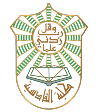Most modern educational institutions adopt some form of e-learning, and in the future, the traditional role will shift to a system that primarily includes virtual programs and open-access learning platforms, and the use of e-learning systems will become a natural requirement within the overall teaching and learning framework, and it will no longer be referred to as a system separate from the general learning process within the college. E-learning has brought fundamental benefits at both the institutional level and for the students as well, as traditional learning patterns in educational institutions are being transformed and developed through the use of available educational technologies.
It also facilitates the learning process for students by making it easier to follow up, communicate, interact, and engage in various educational activities. From this perspective, the E-Learning Unit was established to maximize the benefits for students and to enhance the performance and educational role of the teaching staff. The college strives to employ information and communication technology to improve the quality of teaching and learning, by gradually transitioning toward the creation of a distinguished interactive learning environment and achieving the best possible learning outcomes.

